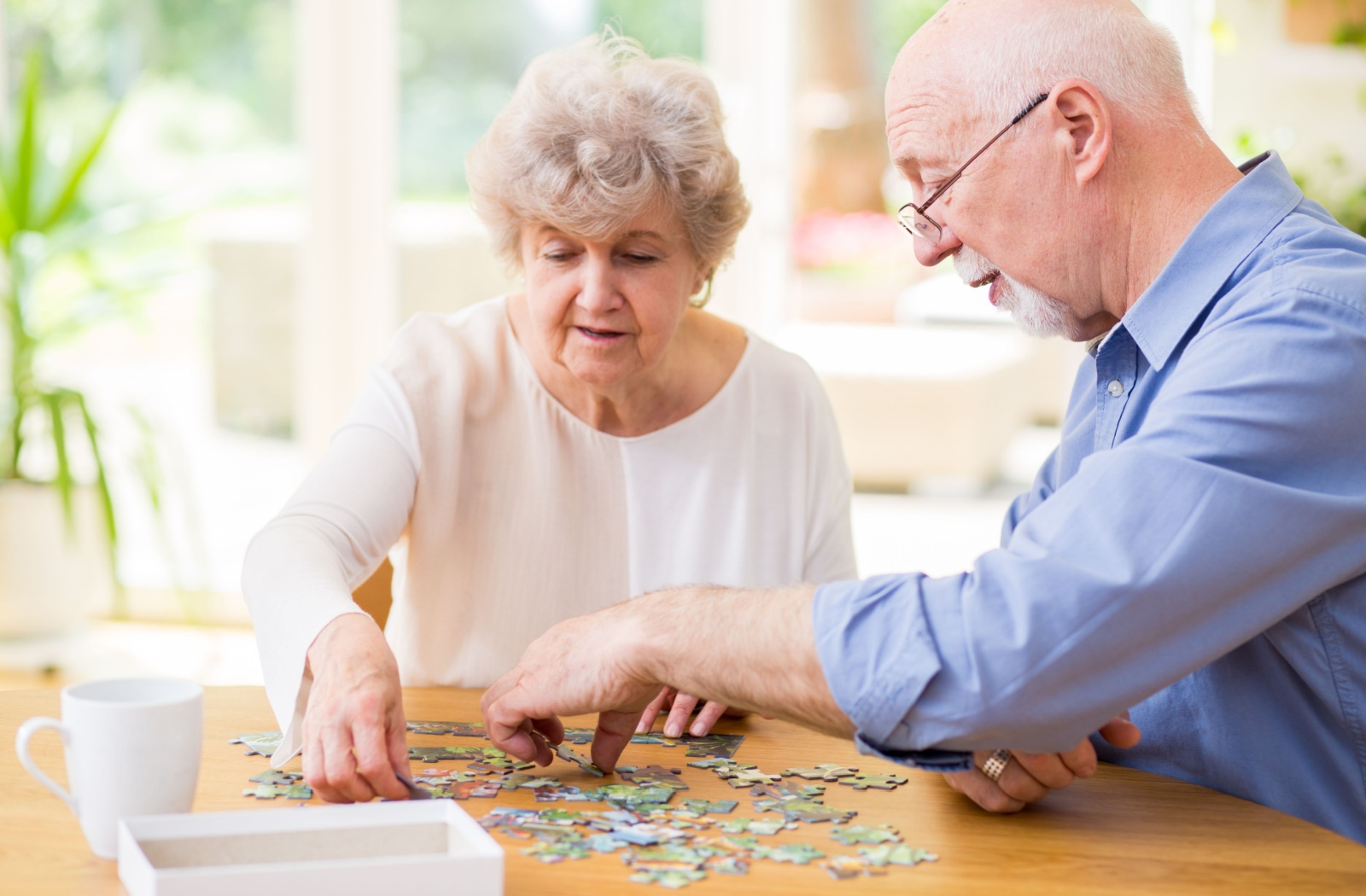Key Takeaways
- Puzzles and trivia offer cognitive benefits for older adults with memory challenges.
- Trivia and group games help reduce isolation and support emotional well-being.
- Music, movies, nature, and history trivia can spark recognition and engagement.
- Jigsaw puzzles, sorting activities, and word games support different abilities.
- Games become more effective when tailored to personal interests and comfort
- A calm, inviting setting with the right structure can improve overall participation.
The Benefits of Puzzles and Games When Dementia Is Involved
When someone you care about faces memory challenges, proactivity is key. You’ll want to find ways to engage their mind, because this is key to slowing cognitive decline. Fortunately, puzzles and games serve as wonderful options that stimulate and engage the brain.
Puzzles and trivia games can provide valuable mental stimulation, social connection, and a sense of accomplishment. For seniors with dementia, this can be incredibly helpful. These activities strengthen the mind and slow cognitive decline, which makes a significant difference when dementia is involved.
Why Puzzles and Trivia Games Help Seniors With Memory Challenges
Puzzles and trivia are excellent ways to boost the mind. They challenge different areas of the brain and help strengthen neural connections. This makes them excellent options for preserving cognitive abilities.
Mental Stimulation and Cognitive Benefits
Incorporating puzzles into a daily routine adds structure and offers an accessible way to keep the mind active. These activities encourage pattern recognition, memory recall, and creative problem-solving in a low-pressure, enjoyable setting. The brain is like a muscle, and the more a person uses it, the stronger it becomes.
Social Connection and Interaction Opportunities
Group trivia and puzzle sessions naturally encourage conversation and shared moments. Participants can work together, trade ideas, and enjoy lighthearted competition. All of these reduce isolation—a factor known to worsen cognitive decline.
Sense of Accomplishment and Purpose
Solving a puzzle or answering a trivia question offers a small, satisfying win. These moments of success can brighten the day and reinforce a sense of confidence. Participating in group games also provides a way to contribute, stay engaged, and experience a renewed sense of purpose.
Trivia Game Categories That Engage and Entertain
Trivia games are particularly helpful for lowering the effects of cognitive decline. These games challenge your brain and force you to recall different pieces of information. This helps preserve memory and brain health over time.
Nature and Animal Questions
Nature-themed trivia can prompt familiar memories in a gentle, approachable way. Questions like “What sound does a cow make?” or “What color are robins’ eggs?” often connect to everyday experiences and encourage participation without pressure. These lighthearted prompts help create a comfortable atmosphere.
History and Past Events
Major historical events—such as the moon landing or the end of World War II—often remain vivid in long-term memory. Focus on major events rather than specific dates to make questions more accessible. This way, you can spark stories and personal reflections, which can also work as a form of reminiscence therapy.
Music From Their Era
Songs from the 1940s, 1950s, and 1960s often trigger strong memories and emotional responses. So, it helps to try trivia games based on songs from your loved one’s past. Even a few opening notes or a single lyric can bring back strong emotional memories and encourage sing-alongs.
Movies and Hollywood Stars
Questions about stars they grew up seeing on television can open the door to lively discussions about favorite scenes, quotes, or moviegoing memories. If possible, including photos or posters can help spark recognition and connection.
“Who Am I?” Memory Games
Guessing games using clues about famous people, characters, or even fellow participants create interactive experiences. Start with obvious clues and gradually provide more specific details. These games encourage active listening and deductive reasoning while maintaining an element of surprise and discovery.
Choosing the Right Puzzle Types and Difficulty Levels
Puzzles are just as helpful for strengthening the mind. So, it helps to take some time and choose a selection that suits your loved one’s abilities.
Jigsaw Puzzles With Larger Pieces
Jigsaw puzzles with 12 to 24 large pieces are often a good fit for older adults experiencing memory challenges. Look for images with high contrast, familiar themes like flowers or animals, and clearly defined edges. These puzzles offer both tactile engagement and a rewarding sense of completion.
Sorting and Matching Activities
Organizing buttons by color or matching images with words can offer light structure and purposeful focus. These tasks use basic recognition and sorting skills while creating clear, achievable outcomes. Repeating simple categories—especially those tied to everyday life—can also offer a calming rhythm.
Word Puzzles and Crosswords
Simplified crossword puzzles with larger print and basic vocabulary work well for some participants. Word search puzzles with familiar terms or fill-in-the-blank exercises using common phrases can also give gentle stimulation.

Making Games More Accessible and Enjoyable for Someone with Dementia
Creating an inviting, low-pressure environment makes trivia and puzzle games more engaging for older adults. With a few thoughtful adjustments, these activities can become more enjoyable and accessible for everyone.
So, to make games more accessible, it helps to:
- Begin with simple, encouraging questions to build early momentum.
- Introduce slightly more challenging material gradually.
- Use multiple-choice formats with three options to support memory recall.
- Tailor questions to participants’ backgrounds, interests, and past careers.
- Use meaningful conversation starters to uncover personal topics.
- Choose quiet, well-lit spaces with minimal distractions.
- Arrange seating in circles or small groups to encourage connection.
- Keep materials close at hand and easy to manage.
Keep sessions to appropriate lengths—typically 30-45 minutes—to maintain attention without causing fatigue.
Mental Stimulation in Senior Living
Senior living communities like ours here at Somerby Franklin aren’t just a place to live. We’ve worked hard to create a home designed to help residents thrive every day. We offer all kinds of amenities and programs—including puzzle and game nights—to stimulate people’s minds and help them strengthen their brains. The right environment matters, after all!
Here in our community, we love planning events to help residents thrive. Our activity programs are designed to engage minds, foster connections, and support continued growth and learning. So, if you’re considering senior living for a loved one, reach out to our team. Book a tour with us today, and you can see in person how committed we are to making a difference.










